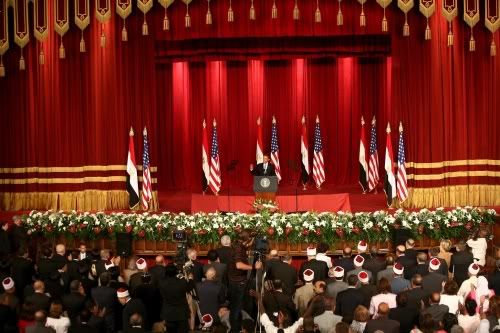
He sets the stage for how to approach the divisions between the Muslim world and the West this way:
Of course, recognizing our common humanity is only the beginning of our task. Words alone cannot meet the needs of our people. These needs will be met only if we act boldly in the years ahead; and if we understand that the challenges we face are shared, and our failure to meet them will hurt us all.
For we have learned from recent experience that when a financial system weakens in one country, prosperity is hurt everywhere. When a new flu infects one human being, all are at risk. When one nation pursues a nuclear weapon, the risk of nuclear attack rises for all nations. When violent extremists operate in one stretch of mountains, people are endangered across an ocean. When innocents in Bosnia and Darfur are slaughtered, that is a stain on our collective conscience. That is what it means to share this world in the 21st century. That is the responsibility we have to one another as human beings.
And this is a difficult responsibility to embrace. For human history has often been a record of nations and tribes -- and, yes, religions -- subjugating one another in pursuit of their own interests. Yet in this new age, such attitudes are self-defeating. Given our interdependence, any world order that elevates one nation or group of people over another will inevitably fail. So whatever we think of the past, we must not be prisoners to it. Our problems must be dealt with through partnership; our progress must be shared.
This signals a complete break with the neo-conservative idea of Pax Americana and the Bush administration's proclivity to think that the United States could dictate democracy in other countries from the barrel of a gun.
And then he goes on to discuss particular issues, including the wars in Iraq and Afghanistan, Israel and Palestine, and Iran. At that point, he addresses the issue of democracy - especially pertinent to what is happening in the Middle East today.
I know -- I know there has been controversy about the promotion of democracy in recent years, and much of this controversy is connected to the war in Iraq. So let me be clear: No system of government can or should be imposed by one nation by any other.
That does not lessen my commitment, however, to governments that reflect the will of the people. Each nation gives life to this principle in its own way, grounded in the traditions of its own people. America does not presume to know what is best for everyone, just as we would not presume to pick the outcome of a peaceful election. But I do have an unyielding belief that all people yearn for certain things: the ability to speak your mind and have a say in how you are governed; confidence in the rule of law and the equal administration of justice; government that is transparent and doesn't steal from the people; the freedom to live as you choose. These are not just American ideas; they are human rights. And that is why we will support them everywhere.
Now, there is no straight line to realize this promise. But this much is clear: Governments that protect these rights are ultimately more stable, successful and secure. Suppressing ideas never succeeds in making them go away. America respects the right of all peaceful and law-abiding voices to be heard around the world, even if we disagree with them. And we will welcome all elected, peaceful governments -- provided they govern with respect for all their people.
This last point is important because there are some who advocate for democracy only when they're out of power; once in power, they are ruthless in suppressing the rights of others. So no matter where it takes hold, government of the people and by the people sets a single standard for all who would hold power: You must maintain your power through consent, not coercion; you must respect the rights of minorities, and participate with a spirit of tolerance and compromise; you must place the interests of your people and the legitimate workings of the political process above your party. Without these ingredients, elections alone do not make true democracy.
He goes on to talk about religious freedom, women's rights, and economic development.
Then he ends with this:
It's easier to start wars than to end them. It's easier to blame others than to look inward. It's easier to see what is different about someone than to find the things we share. But we should choose the right path, not just the easy path. There's one rule that lies at the heart of every religion -- that we do unto others as we would have them do unto us. This truth transcends nations and peoples -- a belief that isn't new; that isn't black or white or brown; that isn't Christian or Muslim or Jew. It's a belief that pulsed in the cradle of civilization, and that still beats in the hearts of billions around the world. It's a faith in other people, and it's what brought me here today.
As we watch Obama react to the changes and tensions that are being expressed in the Middle East, we can be confident that these are the guiding principles and ideals that form the foundation of his response.




No comments:
Post a Comment